In today's fast-paced service and construction industries, the gap between field crews and office staff leads to costly delays, invoicing errors, and communication breakdowns. Traditional methods like paper forms, scattered texts, and late-night phone calls are no longer sustainable. This is where modern field reporting software becomes a game-changer, transforming messy, inconsistent data into structured, actionable insights. These platforms don't just digitize paperwork; they create a single source of truth. This enables real-time progress tracking, instant photo documentation, and seamless data flow for faster billing and better project management.
Choosing the right tool, however, can be overwhelming with so many options available. When making the shift, it's crucial to understand common pitfalls and best practices, especially when implementing digital defect reporting tools to ensure a smooth transition for your team.
This guide simplifies your decision by breaking down the top 12 field reporting software solutions. We analyze their unique strengths, limitations, pricing, and ideal use cases for specific trades. For each platform, you'll find a detailed review with screenshots and direct links, helping you confidently select the perfect tool to streamline your operations and connect your field and office teams.
1. Nora
Nora by ResQ stands out as a revolutionary AI-powered assistant that fundamentally transforms how trade businesses handle field reporting. Instead of forcing technicians to adopt yet another new application, Nora leverages the universal familiarity of WhatsApp. This approach significantly lowers the barrier to entry, making it an exceptionally intuitive piece of field reporting software for crews who are already comfortable with the messaging platform. The core strength lies in its ability to convert unstructured field updates - voice notes, texts, photos, and videos - into structured, actionable data without manual intervention.

This process streamlines the entire workflow from the field to the office. The AI handles transcription, translation, and intelligent tagging, creating clean, organized job notes. These are then compiled into a centralized portal, providing administrative staff with immediate access to accurate logs for invoicing, client communication, and progress tracking. Nora's design directly addresses the common pain point of illegible, incomplete, or delayed truck notes, which often stalls billing and creates operational friction.
Key Features and Analysis
- WhatsApp-Based Interface: The use of WhatsApp as the primary user interface is Nora’s most significant advantage. It eliminates the learning curve and app fatigue, encouraging immediate and consistent adoption by field technicians.
- AI-Powered Data Processing: Nora automatically transcribes, translates, tags, and formats all incoming notes. Its AI is specifically trained for trade terminology, ensuring high accuracy and relevance in the final, organized logs.
- Centralized Web Portal: While the field team uses a simple interface, the office team benefits from a powerful web portal that aggregates all data. This creates a single source of truth for every job, accessible in real-time.
- Intelligent Follow-Up: If a note is ambiguous, Nora’s AI can prompt the technician with clarifying questions, ensuring the final report is complete and accurate without needing a back-and-forth call from the office.
- Seamless Integration: Nora is built to integrate with existing field management software, ensuring that the structured data it creates can be pushed directly into your primary system of record, preserving established workflows.
Who Is It Best For?
Nora is an ideal solution for service-based trade companies of all sizes, especially those in HVAC, plumbing, electrical, and general maintenance. It is particularly valuable for businesses struggling with inconsistent or poor-quality field notes that delay invoicing and create administrative bottlenecks. If your goal is to improve communication between your field and office teams and accelerate your billing cycle, Nora offers a powerful and modern solution.
Key Benefit: By automating the tedious task of note-taking and organization, Nora frees up technicians to focus on their work and empowers office staff to bill faster and more accurately, directly impacting cash flow and operational efficiency.
Pricing and Access
Nora is currently available through a demo and a guided onboarding process. Pricing details are provided upon consultation, as the service is tailored to your business's specific needs and scale. It's important to note that while its integration capabilities are expanding, it is currently in beta with select field management platforms, so prospective users should confirm compatibility.
- No new app to learn; uses the familiar WhatsApp interface.
- Automates transcription, translation, and formatting of notes.
- Centralized portal provides clean, real-time job logs.
- Integrates with existing field management software.
- Integration compatibility is currently limited as it's in beta.
- Effectiveness relies on clear input from field users.
Website: Learn more about Nora
2. SafetyCulture (iAuditor)
SafetyCulture (iAuditor) positions itself as a mobile-first platform designed to empower frontline workers. This field reporting software excels at simplifying data capture for safety audits, quality control inspections, and daily operational checks across various trades. Its core strength lies in its extensive library of customizable "smart" templates, allowing teams to quickly digitize existing paper forms or build new ones from scratch. This makes it highly adaptable for electricians documenting site safety, HVAC technicians logging maintenance tasks, or plumbers verifying installation quality.
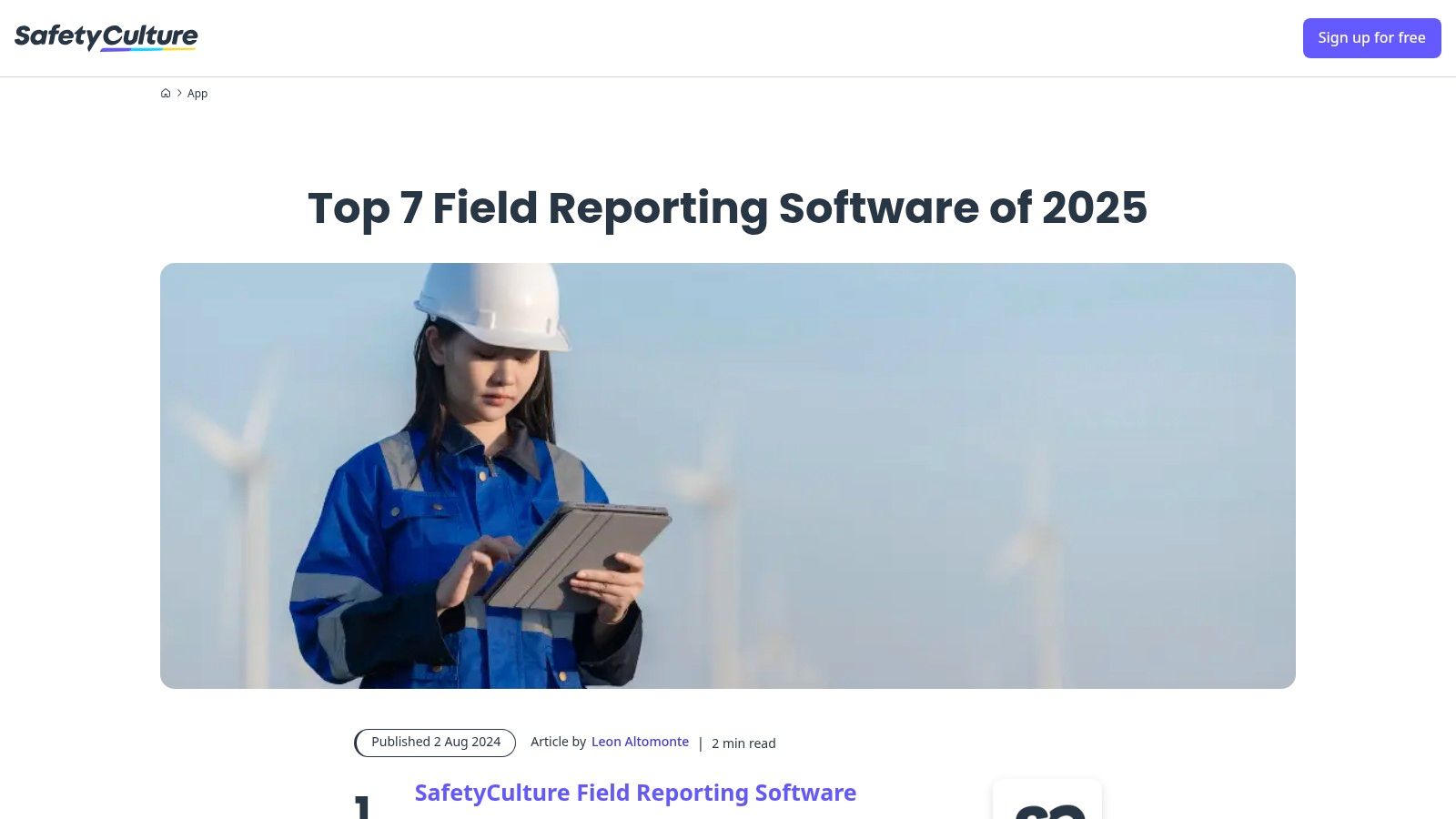
The platform is built for real-time communication, enabling technicians to attach photos with annotations, videos, and notes directly within their reports. Office staff gain immediate visibility into field activities, allowing for rapid response to identified hazards or non-compliance issues. The ability to assign corrective actions directly from an inspection report streamlines workflow and ensures accountability.
Key Details & Use Cases
- Best For: Businesses prioritizing safety, compliance, and quality control. Ideal for trades that perform regular, structured inspections like fire suppression, electrical safety audits, and commercial landscaping quality checks.
- Pricing: Offers a free plan for up to 10 users, which is excellent for small teams or for trying the platform. Premium plans unlock advanced features like analytics, integrations, and unlimited data retention.
- Extensive public library of inspection templates.
- Real-time reporting and issue tracking.
- Rich media attachments (photos, videos).
- Offline functionality for remote job sites.
Website: SafetyCulture (iAuditor)
3. Fieldwire
Fieldwire is a job site management platform built specifically for the construction industry, but its robust features make it an excellent field reporting software for various trades. It focuses on connecting the entire project team, from the project manager in the office to the technician on-site. The platform excels at plan viewing, task management, and issue tracking directly on project blueprints, making it ideal for electricians, plumbers, and HVAC installers who need to document work against specific architectural plans.

The system allows users to create customized reports, such as daily logs, inspection requests, and punch lists, which can be generated on-demand or scheduled automatically. This real-time data flow ensures that stakeholders are always informed about progress and any roadblocks. Fieldwire’s strength is its ability to centralize communication and documentation, reducing the risk of miscommunication and ensuring every action is recorded and traceable on the project record.
Key Details & Use Cases
- Best For: Construction-focused trades and general contractors who heavily rely on blueprints and plans for daily work. Perfect for documenting installations, managing punch lists, and tracking progress on complex job sites.
- Pricing: A free "Basic" plan is available for small teams (up to 5 users). Paid tiers (Pro, Business) unlock unlimited projects, custom form templates, and advanced reporting features.
- Blueprint and plan management with markups.
- Task management and punch list tracking.
- On-demand and scheduled PDF reports.
- Photo and file management with location data.
Website: Fieldwire
4. Autodesk Build
Autodesk Build unifies project management, quality, safety, and project closeout into a single, comprehensive platform. As a powerful piece of field reporting software, it is engineered for the complexities of large-scale construction, connecting field and office teams with a centralized source of information. It moves beyond simple daily logs by integrating data across the entire project lifecycle, from design to operations. This makes it a go-to solution for general contractors, project managers, and specialty trades working on complex commercial or industrial builds.
The platform excels at connecting field data directly to the broader project plan. Technicians can submit daily reports, complete checklists, and manage photos, with all information instantly available to the entire project team. Its standout feature is the deep integration with other Autodesk products like BIM 360, allowing teams to link field reports and issues directly to 2D sheets and 3D models. This level of integration provides unparalleled context and helps prevent costly rework.
Key Details & Use Cases
- Best For: Large construction firms, general contractors, and specialty trades (like commercial HVAC or electrical) involved in complex, multi-stage projects.
- Pricing: Pricing is typically quote-based and tailored to the size and needs of the project or enterprise. It is positioned at a premium price point.
- Unified photo and video management with robust tagging.
- Customizable daily construction reports.
- Predictive insights and analytics based on project data.
- Seamless integration with BIM and other Autodesk tools.
Website: Autodesk Build
5. BlueFolder
BlueFolder is a field service management platform that places a strong emphasis on the financial and operational reporting side of field service. This specialized field reporting software is engineered to provide deep insights into profitability, labor utilization, and expenses. It’s particularly effective for service-based trades like HVAC, equipment repair, and IT services that need to closely track the financial performance of every job and technician. The system moves beyond simple data collection to offer powerful, built-in reports that translate field activities into measurable business metrics.
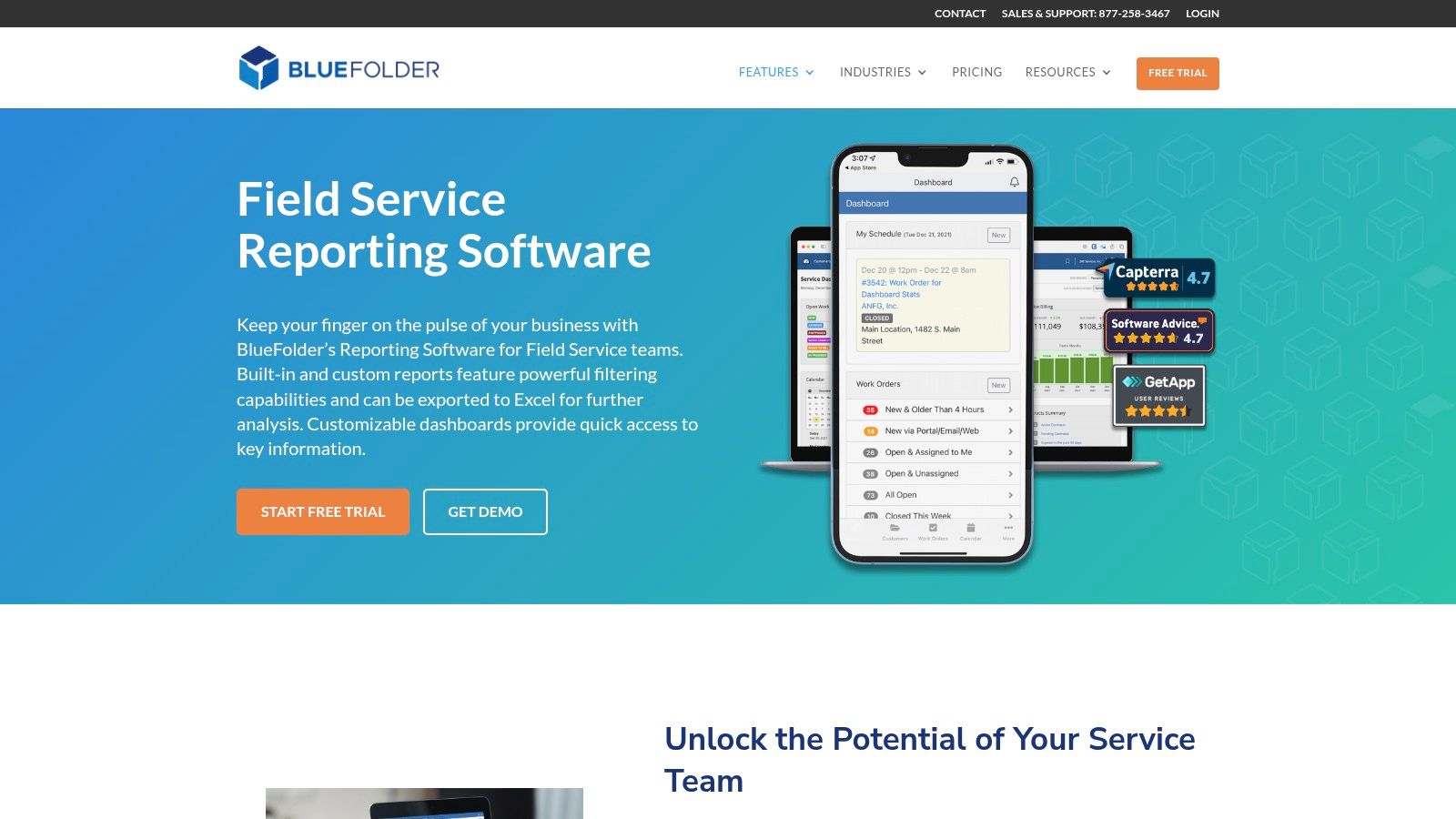
The platform’s strength lies in its native dashboards and customizable reporting engine. While technicians in the field use mobile access to log time and materials, office staff can immediately monitor key performance indicators related to service billings and technician productivity. This allows managers to identify profitable services or pinpoint areas where labor costs are escalating, making it a strategic tool for business optimization rather than just a daily reporting utility.
Key Details & Use Cases
- Best For: Service businesses focused on profitability analysis and operational efficiency. Excellent for trades like commercial refrigeration, food equipment technicians, and managed IT services that need to track detailed labor and parts costs against service contracts.
- Pricing: Pricing is not publicly listed and requires contacting the BlueFolder sales team for a custom quote based on company size and needs.
- Native dashboards for real-time service team monitoring.
- Built-in reports on billings, profitability, and labor.
- Customizable reports and data filters.
- Mobile access for field data entry.
Website: BlueFolder
6. Scoop Solar
Scoop Solar offers a highly specialized field reporting software tailored for the renewable energy and construction sectors. The platform is engineered to manage the complex, multi-stage workflows inherent in solar installations and large-scale construction projects. Its strength lies in providing a centralized hub for real-time data collection, project tracking, and communication between dispersed field crews and office-based project managers. Technicians can capture critical data, photos, and sign-offs directly from the job site, ensuring project milestones are documented accurately and instantly.
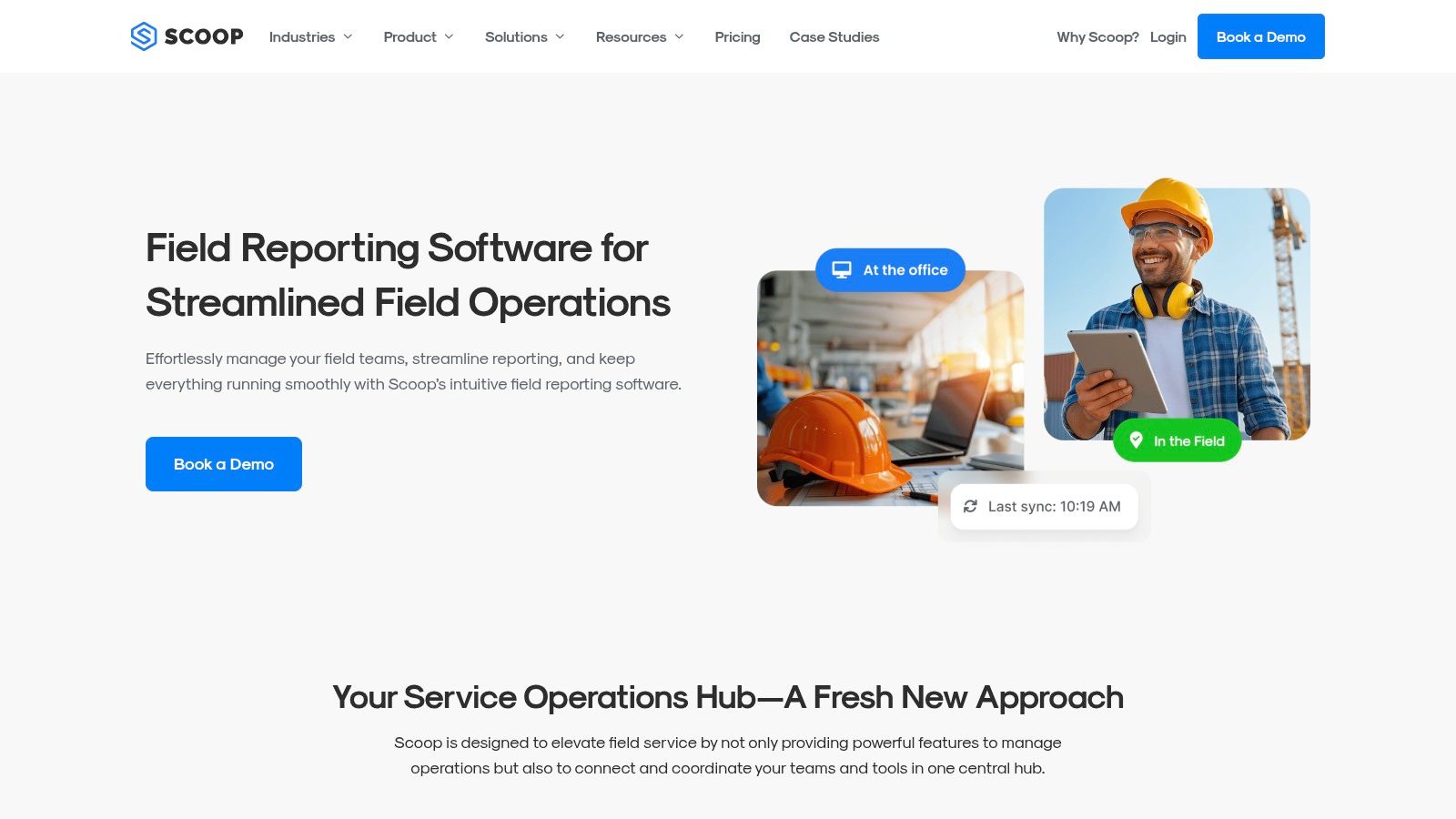
The system enhances operational visibility through customizable dashboards and robust analytics, allowing managers to monitor progress and identify bottlenecks. This makes it particularly effective for companies managing solar panel installations, electrical system commissioning, or commercial construction phases. The inclusion of offline access is crucial for remote sites where internet connectivity is unreliable, ensuring productivity is never halted.
Key Details & Use Cases
- Best For: Businesses in the renewable energy, solar, and construction industries that require specialized project management and field data collection tools.
- Pricing: Specific pricing details are not publicly listed. Businesses must request a demo to receive a customized quote based on their needs.
- Real-time data collection and reporting.
- Customizable dashboards and analytics.
- Mobile app with full offline functionality.
- Automated workflows and task management.
Website: Scoop Solar
7. GoAudits
GoAudits offers a highly versatile and intuitive platform for creating and managing digital checklists and audits. This field reporting software is engineered for simplicity, allowing businesses in construction, hospitality, and manufacturing to quickly transition from paper forms to dynamic, mobile-first inspections. Its strength lies in its user-friendly interface, which empowers field technicians to conduct thorough site audits, safety checks, or operational reviews with minimal training. The platform excels at standardizing data collection across diverse teams and locations.
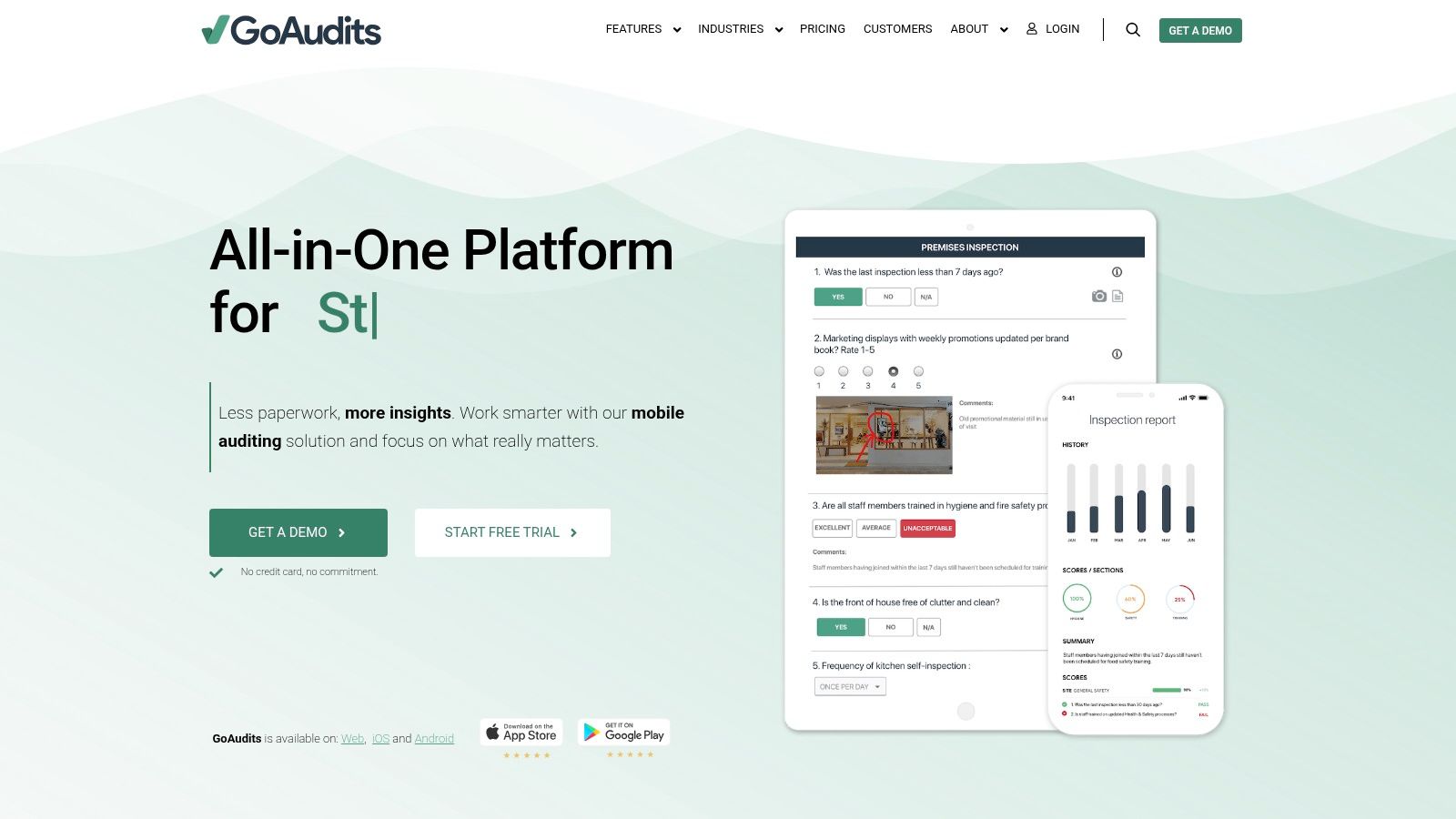
Technicians can easily capture photos, add notes, and assign scores directly within the app, even when offline. Back in the office, managers receive instant, professional-looking reports and can view real-time dashboard analytics to spot trends or recurring issues. This immediate feedback loop makes GoAudits a powerful tool for improving compliance and operational efficiency, whether for a handyman documenting a repair or a facility manager overseeing multiple properties.
Key Details & Use Cases
- Best For: Businesses needing a straightforward, multi-industry inspection tool. Particularly effective for franchise compliance, retail store audits, and hospitality quality control.
- Pricing: Offers a 14-day free trial. Paid plans are tiered based on features and the number of users, starting with a Starter plan for small teams.
- Drag-and-drop custom checklist builder.
- Automated PDF and web-based report generation.
- Mobile app with full offline functionality.
- Corrective action tracking and assignment.
Website: GoAudits
8. Fulcrum
Fulcrum is a highly flexible field reporting software platform centered around its powerful, location-aware data collection capabilities. It empowers businesses to replace cumbersome paper-based processes with dynamic, customizable digital forms accessible on any mobile device. This makes it an excellent fit for industries like environmental consulting, utility management, and infrastructure assessment, where geospatial data is as critical as the textual information being collected. The platform excels at creating rich, geo-tagged records for asset inventories and field inspections.
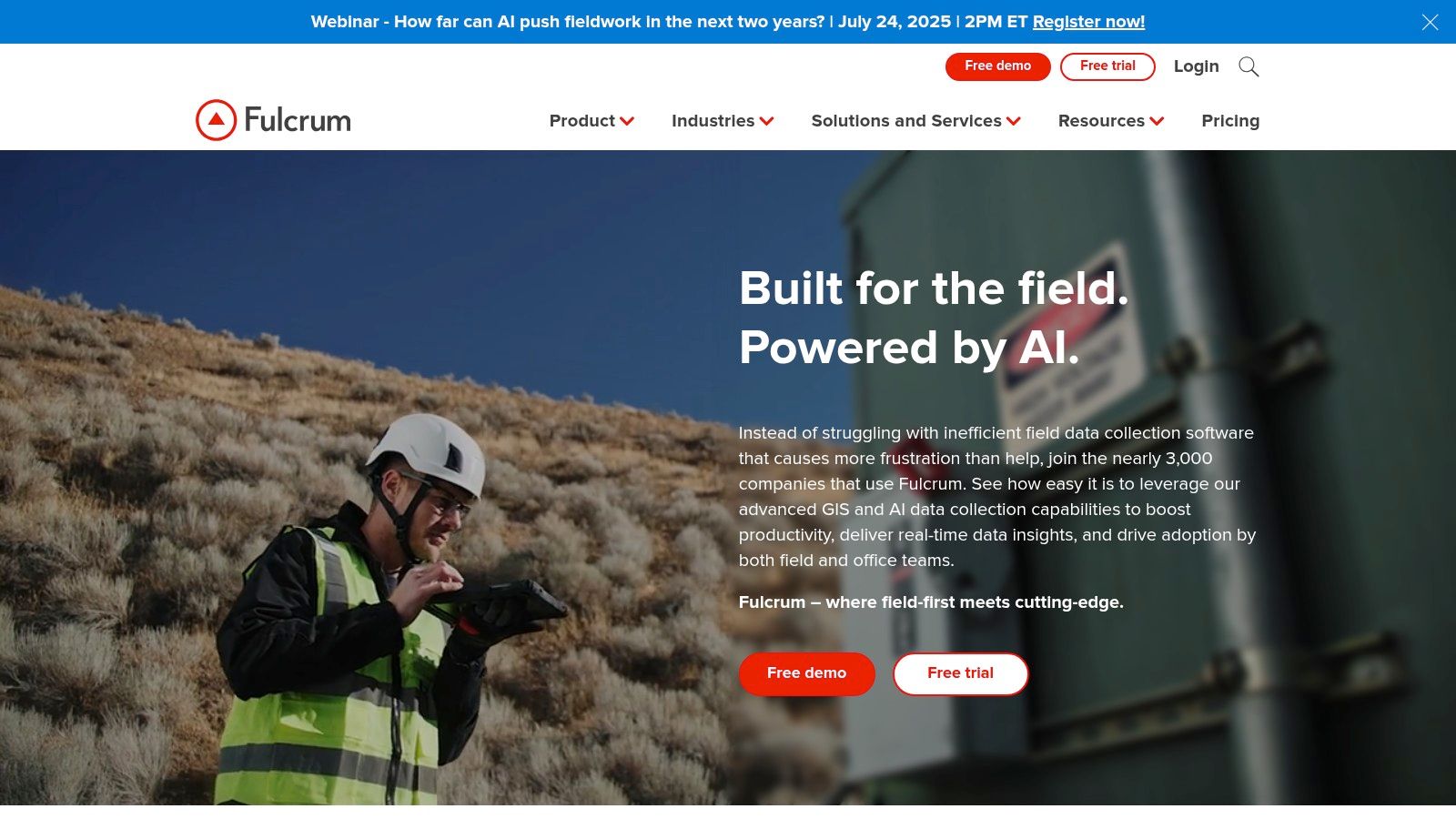
A key differentiator for Fulcrum is its robust offline functionality, which ensures productivity is never hindered by a lack of connectivity in remote locations. Data syncs automatically once a connection is restored, providing office teams with near real-time updates. The ability to integrate with GIS and other business intelligence tools allows for deeper analysis and visualization of field data, turning simple reports into actionable insights for strategic planning and resource allocation.
Key Details & Use Cases
- Best For: Organizations with a strong focus on geospatial data collection, such as environmental scientists mapping sample sites, or public works crews documenting infrastructure assets.
- Pricing: Fulcrum offers several pricing tiers based on features and user count. It is generally positioned for professional teams, and pricing may be high for very small businesses.
- Powerful and customizable digital forms builder.
- Robust offline data collection and automatic syncing.
- Advanced location-based data and mapping features.
- Real-time data updates and reporting dashboard.
Website: Fulcrum
9. FieldPulse
FieldPulse is an all-in-one field service management platform that integrates robust business analytics directly into its workflow. This field reporting software is engineered to provide a 360-degree view of operations, connecting field activities with back-office financial performance. It stands out by embedding powerful revenue and expense tracking within its reporting suite, allowing businesses in trades like HVAC, plumbing, and electrical services to see job profitability in real-time. The emphasis is on turning field data into actionable business intelligence.
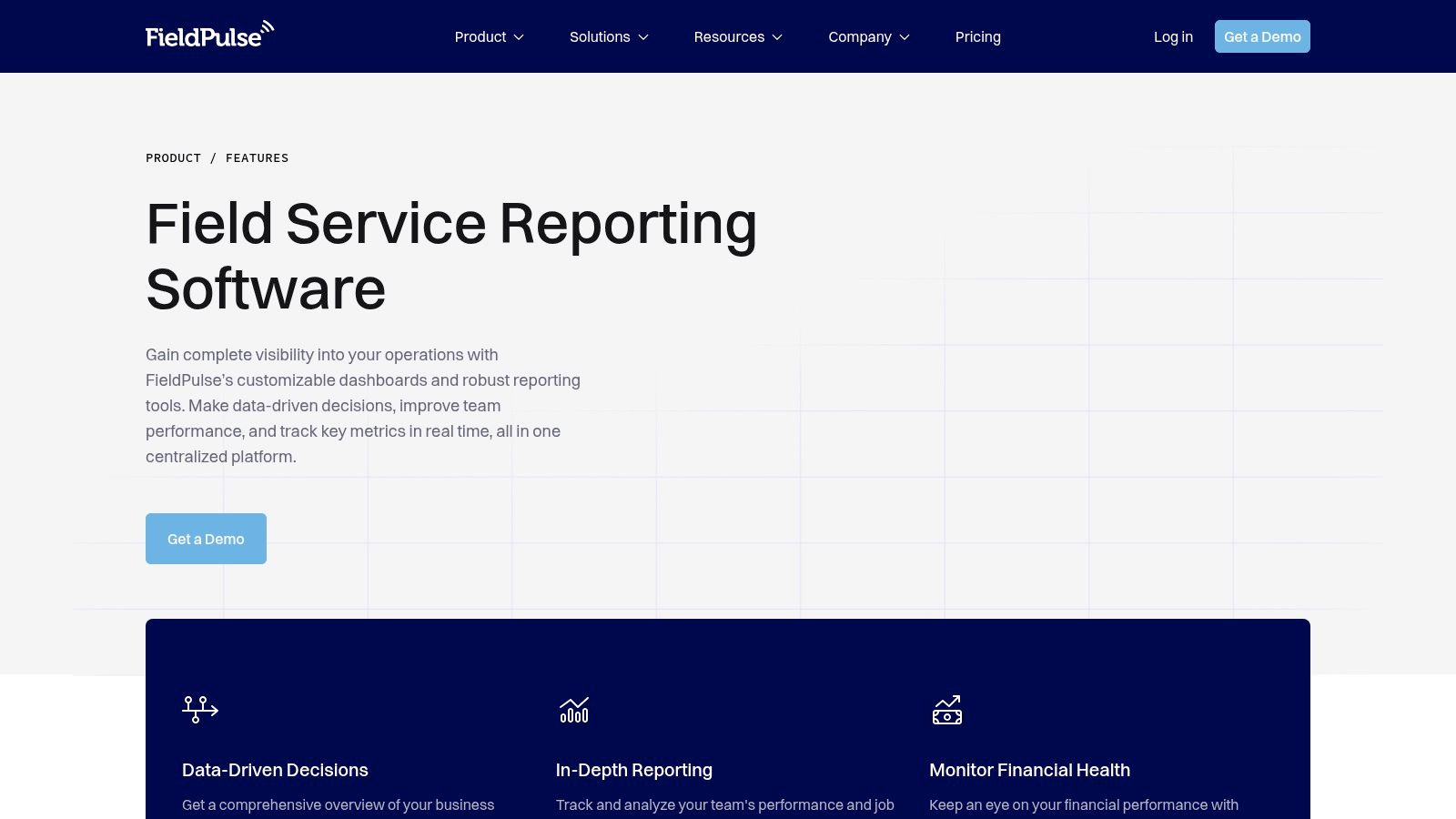
The platform’s customizable dashboards are a key feature, enabling managers to build reports that focus on the metrics that matter most to their specific business, from technician productivity to sales pipeline health. Technicians use the mobile app to update job statuses, create invoices, and capture payments, feeding live data directly into the system. This tight integration ensures that reports are always based on the most current information available from the field.
Key Details & Use Cases
- Best For: Small to medium-sized service businesses seeking to combine operational management with deep financial reporting and business analytics.
- Pricing: Pricing is not publicly listed and requires contacting their sales team for a customized quote based on business size and needs.
- Customizable business dashboards.
- Integrated revenue and expense tracking.
- Advanced reporting tools for profitability analysis.
- Full-featured mobile app for field operations.
Website: FieldPulse
10. Workyard
Workyard offers a unique blend of field reporting, time tracking, and job costing, making it a powerful all-in-one solution for service-based businesses. This platform is built around an accurate GPS time clock, which not only tracks hours but also provides real-time location data and job progress updates. This integration allows managers to see precisely how labor costs are allocated to specific projects, a crucial feature for trades like landscaping, general contracting, and pest control where job profitability is paramount.
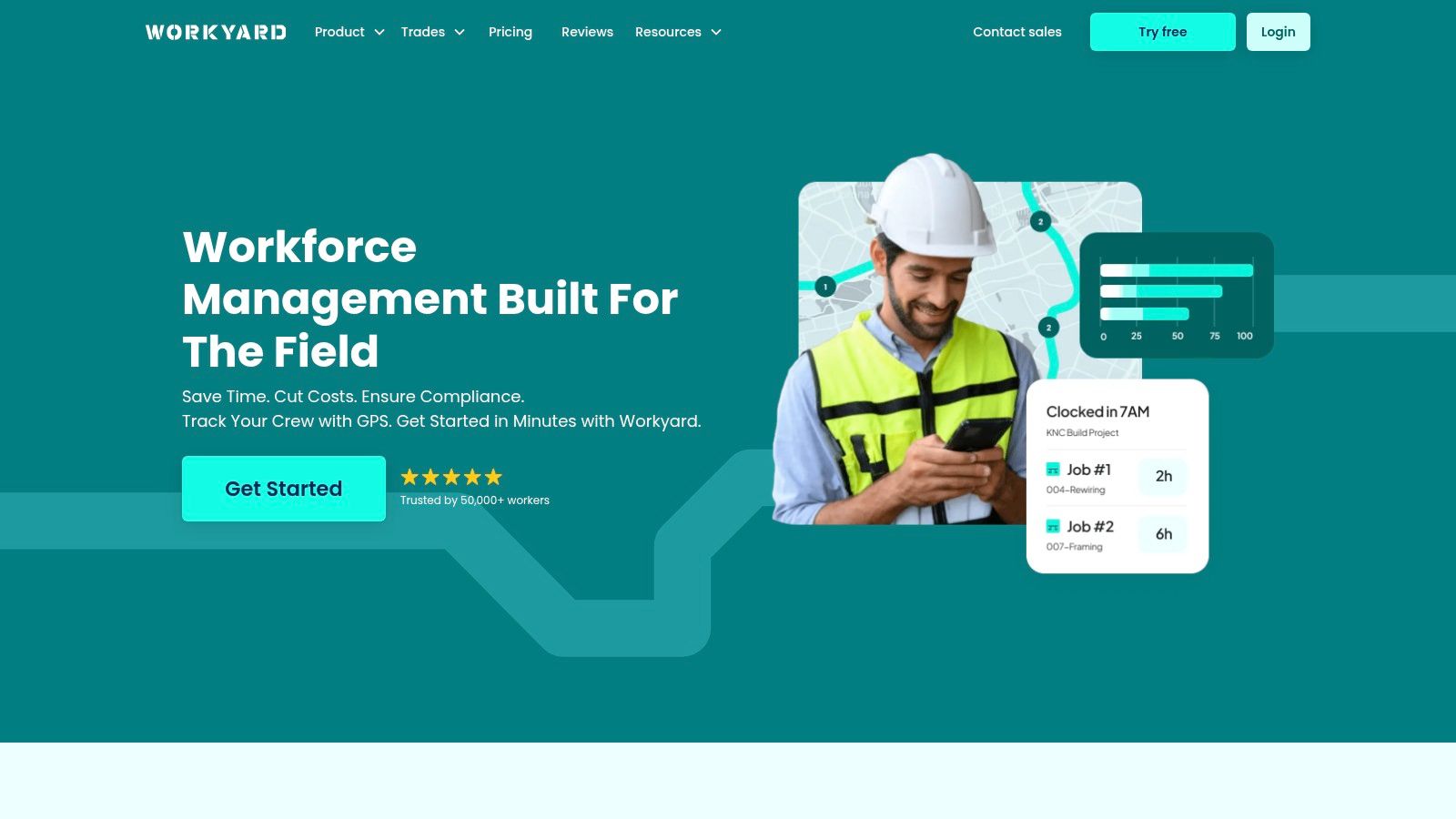
The platform enables technicians to document job progress with photos, notes, and checklists attached directly to their timesheets. This creates a clear, chronological record of work performed, simplifying client invoicing and resolving potential disputes. Office staff can access this information instantly, streamlining payroll and improving the accuracy of future project estimates. Workyard's strength lies in connecting field activities directly to financial outcomes, providing a level of cost visibility that many other field reporting software tools do not.
Key Details & Use Cases
- Best For: Contractors and service businesses focused on accurate job costing and payroll. Excellent for trades like construction, landscaping, and cleaning services that need to track labor hours against specific projects.
- Pricing: Offers a 14-day free trial. Paid plans are user-based, starting with a core plan for time tracking and scheduling, with an add-on for job costing and budgeting.
- High-accuracy GPS time clock with geofencing.
- Automatic job cost tracking and labor cost allocation.
- Real-time job progress updates with photos and notes.
- Offline functionality for continuous time tracking.
Website: Workyard
11. GoCanvas
GoCanvas is a powerful platform centered on digitizing data collection and automating workflows through customizable mobile forms. This field reporting software empowers businesses to replace inefficient paper-based processes with dynamic apps accessible on any smartphone or tablet. It's particularly effective for trades requiring detailed data entry, like pest control technicians documenting chemical usage, HVAC professionals creating detailed work orders, or general handymen generating on-the-spot invoices and collecting signatures.
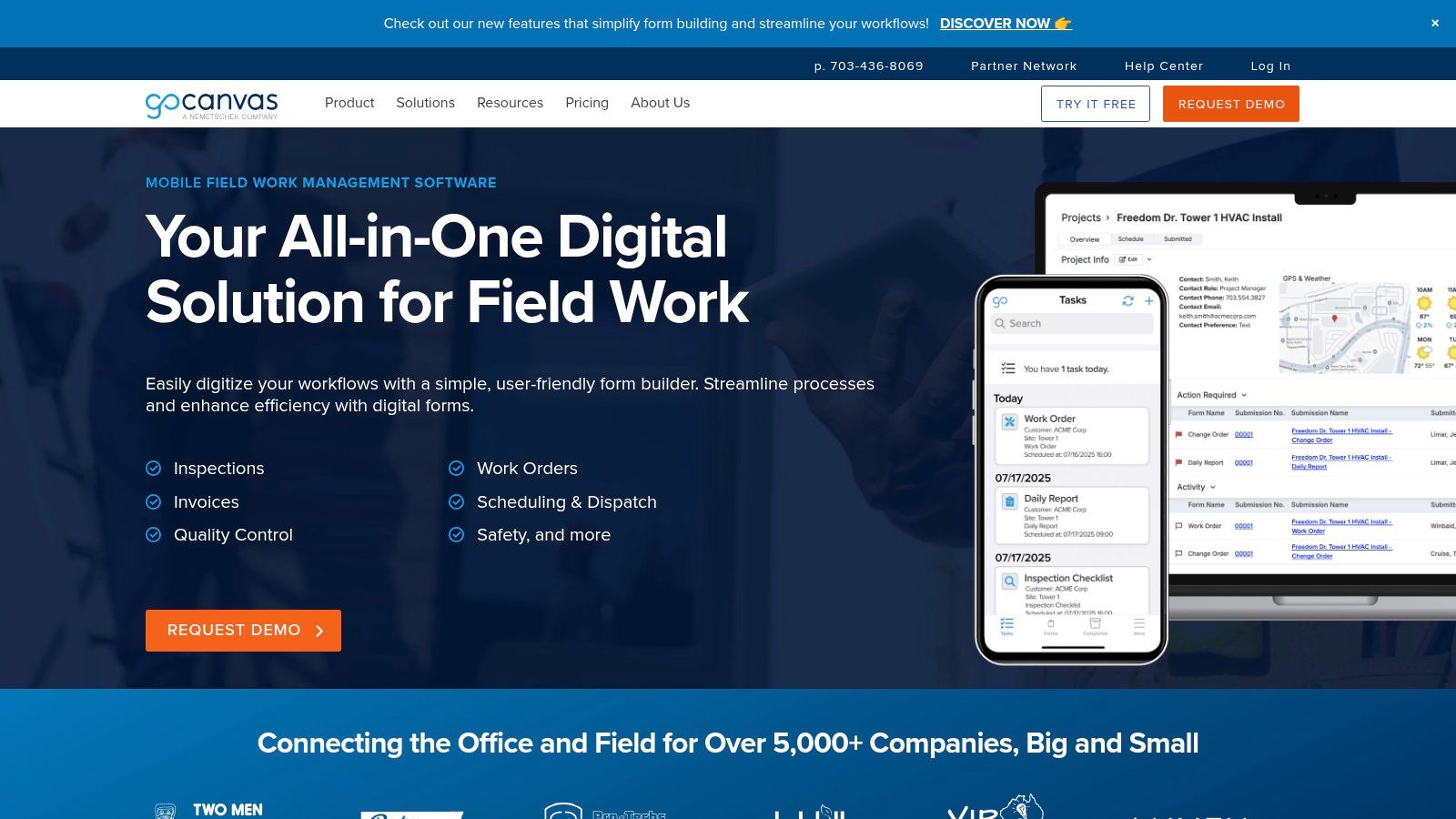
The platform's key differentiator is its robust integration capability, allowing seamless data flow between the field app and back-office systems like ERPs, CRMs, and cloud storage. Technicians can capture information offline in remote locations and have it sync automatically once connectivity is restored. This ensures that critical job site data, from photos to calculations, is immediately available to the entire organization, reducing administrative delays and improving reporting accuracy.
Key Details & Use Cases
- Best For: Companies seeking to completely digitize their paper forms and integrate field data directly into core business software. Ideal for service-based trades focused on work orders, estimates, and compliance forms.
- Pricing: Offers several paid tiers based on the number of users and features. A free trial is available to test the platform's capabilities.
- Drag-and-drop mobile form builder.
- Powerful workflow automation tools.
- Offline data capture and automatic syncing.
- Extensive integration options with popular business systems.
Website: GoCanvas
12. InetSoft
InetSoft offers a data-centric approach to field service management, positioning its solution as a powerful business intelligence and reporting tool rather than a simple form-builder. This platform excels at aggregating data from diverse sources, such as CRM, ERP, and scheduling systems, to create comprehensive, interactive dashboards. This makes it an excellent choice for businesses that need to analyze field performance metrics, track KPIs, and gain deep operational insights beyond standard daily reports. Its strength lies in transforming raw field data into actionable business intelligence.
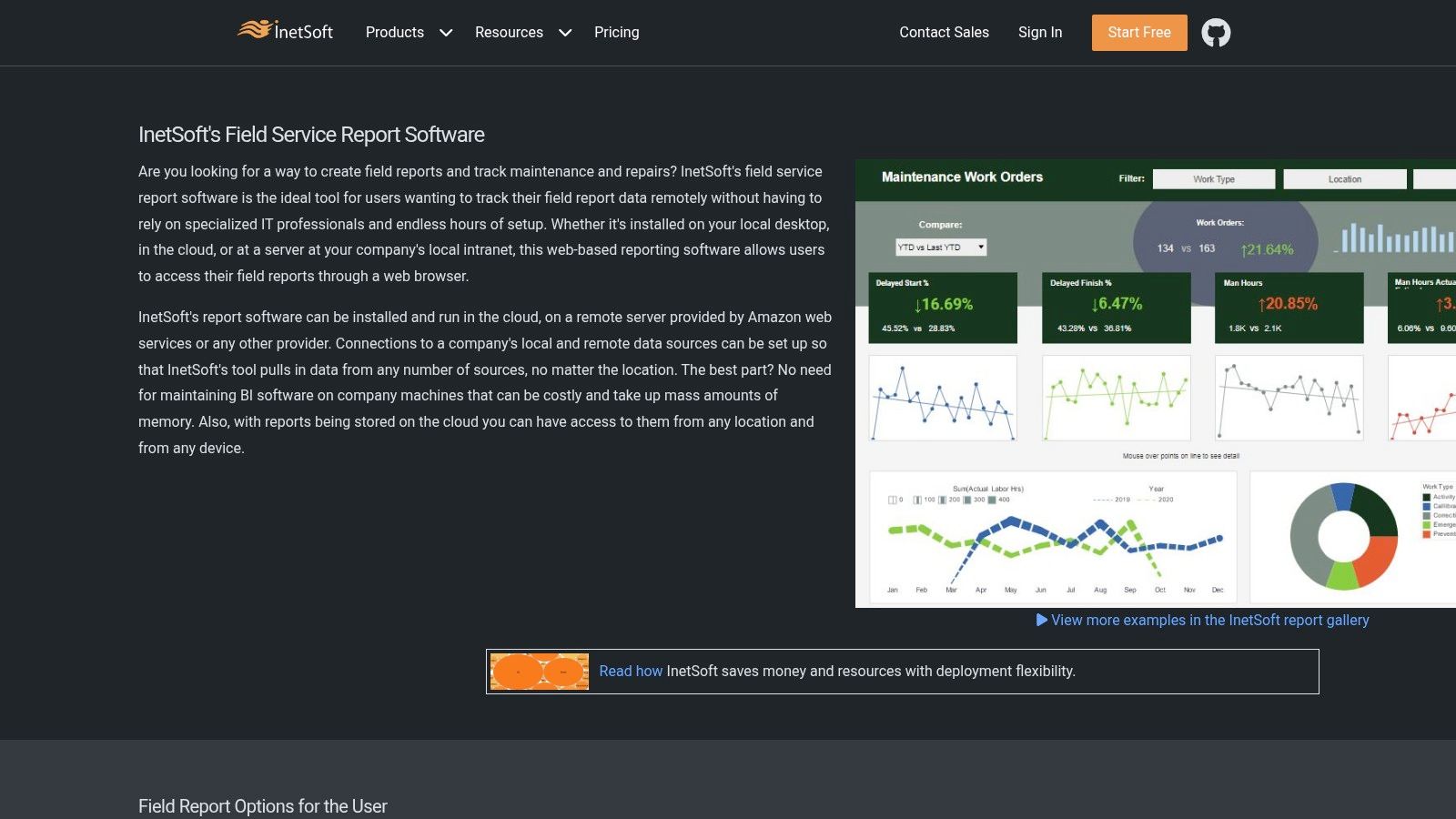
The web-based nature of this field reporting software ensures universal access for office staff without special installations. Field technicians can contribute data, but the platform's primary power is in the hands of managers and analysts who can drill down into performance data, compare team outputs, and forecast trends. The flexibility in deployment, offering both cloud and on-premises options, caters to companies with specific data security or infrastructure requirements.
Key Details & Use Cases
- Best For: Medium to large service businesses focused on data analysis, performance metrics, and integrating field reports with other business systems.
- Pricing: Pricing is not publicly available and requires a direct quote from the sales team.
- Web-based reporting accessible from any browser.
- Highly customizable dashboards and reports.
- Powerful integration with various data sources.
- Interactive data exploration with drill-down capabilities.
Website: InetSoft
Field Reporting Software Comparison of Top 12 Tools
Making the Right Choice: From Data Collection to Business Transformation
Navigating the landscape of field reporting software can feel overwhelming, but the journey from manual data collection to streamlined business operations is well worth the effort. As we've explored, the "best" platform is not a one-size-fits-all solution. Your ideal choice depends entirely on the unique operational DNA of your trade business, your team's technical comfort level, and the specific problems you aim to solve.
The tools detailed in this guide, from comprehensive project management suites like Autodesk Build and Fieldwire to specialized solutions like Scoop Solar, demonstrate the sheer breadth of options available. The key is to move beyond a simple comparison of features and focus on the core function that will deliver the most significant impact to your bottom line and daily workflow. Is your primary pain point complex project documentation, or is it simply getting accurate, timely notes and photos from the field with minimal friction for your technicians?
How to Select the Right Field Reporting Software
To make an informed decision, shift your perspective from "What can this software do?" to "What does my business need it to do?" This strategic pivot will clarify your priorities and guide you to the perfect fit.
Consider these critical factors during your evaluation process:
- Technician Adoption: The most powerful software is useless if your team won't use it. Prioritize solutions with a low barrier to entry. If your technicians are already comfortable with apps like WhatsApp, a tool that integrates with their existing habits, like Nora, will see much higher adoption rates than a complex, multi-layered platform requiring extensive training.
- Integration Capabilities: Your field reporting software shouldn't operate in a silo. Assess how well a potential platform integrates with your existing systems, such as your accounting software, CRM, or parts-ordering platforms. Seamless integration prevents double entry and ensures data flows smoothly from the field to the back office.
- Scalability and Customization: Your business needs will evolve. Look for a solution that can grow with you. Does the software offer customizable forms, workflows, and reports? Can it support more users, larger projects, or different service lines as your company expands? Platforms like GoCanvas and Fulcrum excel here, offering deep customization for specific data collection needs.
- Core Problem Solving: Pinpoint your biggest operational bottleneck. If safety and compliance are paramount, a tool like SafetyCulture (iAuditor) is a strong contender. If your challenge is simply bridging the communication gap between the field and the office for faster invoicing and job costing, a lightweight, AI-powered solution is likely your most effective choice.
Implementing for Success
Once you've made your selection, successful implementation is key to unlocking its full potential. Start with a pilot program involving a small, receptive group of technicians. Gather their honest feedback to identify and resolve any usability issues before a company-wide rollout. Provide clear, concise training that focuses on the "why" behind the new system, emphasizing how it makes their jobs easier and contributes to the company's success.
Choosing the right field reporting software is a strategic business decision that can transform your operations. It’s about more than just digital forms; it’s about empowering your technicians, delighting your customers, and building a more efficient, profitable, and resilient business.
Ready to eliminate reporting friction and empower your technicians with a tool they already know how to use? Discover how Nora leverages AI and WhatsApp to capture rich, accurate job details in seconds, bridging the gap between the field and the office effortlessly. See Nora in action and revolutionize your field reporting today.











